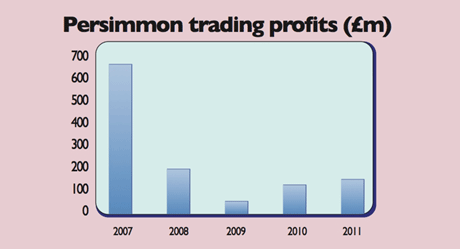
Persimmon has made some canny business moves, but the shares are too risky for us, says Phil Oakley.
The business
Persimmon is one of Britain’s biggest housebuilders. Operating out of 24 regional offices, it trades under three main brands: Persimmon Homes, Charles Church and Westbury Partnerships. The core Persimmon business builds and sells houses, bungalows and apartments. Charles Church concentrates on premium properties, while Westbury focuses on social housing.
The company owns 63,786 building plots with planning permission and a further 16,100 acres of strategic land it hopes to build on in the future. It sold 9,360 houses in 2011.
The history
Duncan Davidson created Persimmon in 1972. He started out building houses in Yorkshire before branching out to other areas of the country. Davidson then spent the next decade or so increasing the scale of the business before floating Persimmon on the London Stock Exchange in 1985.
After experiencing the ups and downs of the 1980s house-price boom and subsequent bust, the 1990s saw Persimmon start to make some big purchases of other housebuilders. In 1996 it bought Ideal Homes. Bigger deals followed in 2001 and 2006 with the purchases of Beazer and Westbury.
The early 2000s were kind to Persimmon. Plentiful cheap mortgages stoked a British housing boom, which led to soaring profits. By 2008, the boom had turned to bust; Persimmon’s profits collapsed and dividend payments were scrapped. Although times were extremely tough, unlike many of its competitors it did not have to ask its shareholders for more money to stay afloat.
Profits are still a long way below the record levels of 2007, but look to be recovering again as Persimmon has cashed in on some smart land buying at the bottom of the market.
The chief executive
Mike Farley has been chief executive since 2006, having joined the company in 1983. He has spent all his career in housebuilding, starting out as a building site foreman in the 1970s. Despite the challenging times, Farley continues to be well compensated, with a total pay packet of £1.9m last year.
Should you buy the shares?
It depends on where you think house prices are going. This is because most of a housebuilder’s value is tied up in its land bank. Land values are highly sensitive to changes in house prices. With other building costs relatively predictable, the price of land is the key determinant of a builder’s profits.
When buying land, a builder will work out what to pay for it by estimating the selling price of the house he wants to build on it. He then takes away his other building costs and the amount of profit he wants to make. The figure left over is the highest price he should pay for the land.
Rising house prices make existing land more profitable and therefore worth more. The opposite is true for falling prices. Persimmon has a bold strategy to pay a series of dividends worth 620p per share between 2013 and 2021, but to do so it needs a favourable climate for house prices.
The key to paying these dividends rests with the value of its current plots. Many of these were bought at bargain prices during the last recession and are very profitable at current house price levels. A lot also depends on its 16,100 acres of strategic land. If Persimmon can get planning permission for this land then it could make large profits from selling houses built on it.
But who is going to buy them? Mortgage availability remains very low. Banks are less willing to lend and buyers require hefty deposits. Persimmon is having to lend money to the buyers of around one quarter of its houses. This shared equity is becoming a bigger part of its balance sheet and looks unsustainable to us. We think house prices remain too high and that the value of land on Persimmon’s books could be worth a lot less than it says it is. With the shares trading at more than asset value, Persimmon looks a very risky investment at current prices. Avoid.
The numbers
Stockmarket code: PSN
Share price: 770p
Net assets (June 2012): £1.9bn
Net cash (June 2012): £135m
P/e (current year estimate): 15.1 times
Price to book value (current): 1.2 times
Yield (prospective): 0%
What the analysts say
Buy: 10
Hold: 6
Sell: 1
Average price target: 748p
Directors’ shareholdings
M Farley (CEO): 1,147,753
J Fairburn (FD): 41,214
N Wrigley (chairman): 26,000